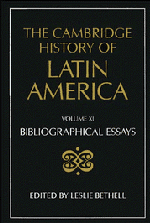Book contents
- Frontmatter
- I THE INDIGENOUS PEOPLES OF MIDDLE AND SOUTH AMERICA ON THE EVE OF THE CONQUEST
- II COLONIAL SPANISH AMERICA
- III COLONIAL BRAZIL
- IV THE INDEPENDENCE OF LATIN AMERICA
- V LATIN AMERICA: ECONOMY, SOCIETY, POLITICS, c. 1820 TO c. 1870
- VI LATIN AMERICA: ECONOMY, SOCIETY, POLITICS, c. 1870 to 1930
- VII LATIN AMERICA: ECONOMY, SOCIETY, POLITICS, 1930 to c. 1990
- VIII IDEAS IN LATIN AMERICA SINCE INDEPENDENCE
- IX LATIN AMERICAN CULTURE SINCE INDEPENDENCE
- 1 Art and literature, c. 1820–c. 1870
- 2 Art and literature, c. 1870–1930
- 3 Narrative since c. 1920
- 4 Poetry since c. 1920
- 5 Indigenous literatures and cultures in the twentieth century
- 6 Art and architecture since c. 1920
- 7 Music since c. 1920
- 8 Cinema
- 9 The mass media
- X THE INTERNATIONAL RELATIONS OF LATIN AMERICA SINCE INDEPENDENCE
- THE CAMBRIDGE HISTORY OF LATIN AMERICA
3 - Narrative since c. 1920
from IX - LATIN AMERICAN CULTURE SINCE INDEPENDENCE
Published online by Cambridge University Press: 28 March 2008
- Frontmatter
- I THE INDIGENOUS PEOPLES OF MIDDLE AND SOUTH AMERICA ON THE EVE OF THE CONQUEST
- II COLONIAL SPANISH AMERICA
- III COLONIAL BRAZIL
- IV THE INDEPENDENCE OF LATIN AMERICA
- V LATIN AMERICA: ECONOMY, SOCIETY, POLITICS, c. 1820 TO c. 1870
- VI LATIN AMERICA: ECONOMY, SOCIETY, POLITICS, c. 1870 to 1930
- VII LATIN AMERICA: ECONOMY, SOCIETY, POLITICS, 1930 to c. 1990
- VIII IDEAS IN LATIN AMERICA SINCE INDEPENDENCE
- IX LATIN AMERICAN CULTURE SINCE INDEPENDENCE
- 1 Art and literature, c. 1820–c. 1870
- 2 Art and literature, c. 1870–1930
- 3 Narrative since c. 1920
- 4 Poetry since c. 1920
- 5 Indigenous literatures and cultures in the twentieth century
- 6 Art and architecture since c. 1920
- 7 Music since c. 1920
- 8 Cinema
- 9 The mass media
- X THE INTERNATIONAL RELATIONS OF LATIN AMERICA SINCE INDEPENDENCE
- THE CAMBRIDGE HISTORY OF LATIN AMERICA
Summary
The last thirty years have seen an extraordinary transformation in Latin American literature, in the recognition it has achieved internationally and in the scholarly resources available for its study. The most ironic aspect of this remarkable cultural phenomenon is that attention has focused precisely on that contemporary period which historians and critics of literature normally tell us must wait until time has passed and critical judgements have sedimented. Thus the New Novel and its euphoric culmination, the ‘Boom’, have received an astonishing amount of concentrated attention – not only from Latin Americanists – while the colonial period and the nineteenth century have languished in relative neglect. B. A. Shaw, Latin American Literature in English Translation (New York, 1976) remains a valuable resource. It can now be supplemented by E. J. Wilson, A to Z of Latin American Literature in English Translation (London, 1991).
bibliographies and dictionaries
Among the most useful bibliographical works are S. M. Bryant, A Selective Bibliography of Bibliographies of Latin American Literature (Austin, Tex., 1976); P. Ward (ed.), The Oxford Companion to Spanish Literature (Oxford, 1978), with good coverage of Spanish American literature despite the title; W. Rela, Guía bibliográfica de la literatura hispanoamericana desde el siglo XIX hasta 1970 (Buenos Aires, 1971); and A. Flores, Bibliografía de escritores hispanoamericanos, 1609–1974 (New York, 1975), a very practical select listing. Indispensable is the remarkable two-volume Panorama historíco-literario de nuestra América, vol. 1, 1900–1943, vol. 2, 1944–1970 (Havana, 1982) which interweaves historical data with literary-cultural entries.
- Type
- Chapter
- Information
- The Cambridge History of Latin America , pp. 907 - 916Publisher: Cambridge University PressPrint publication year: 1995



